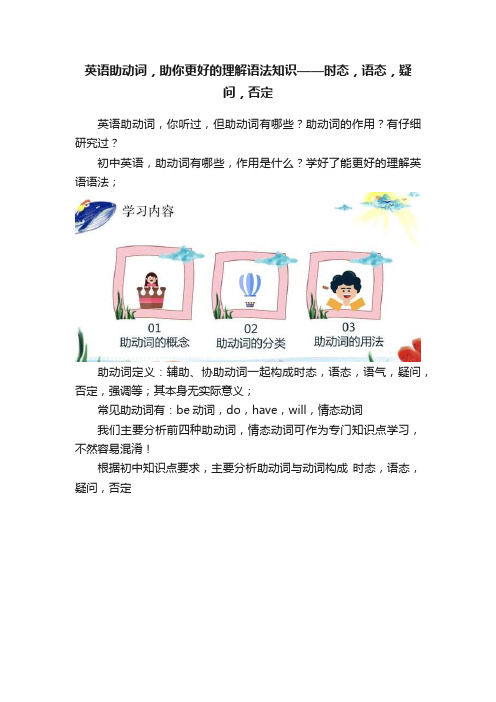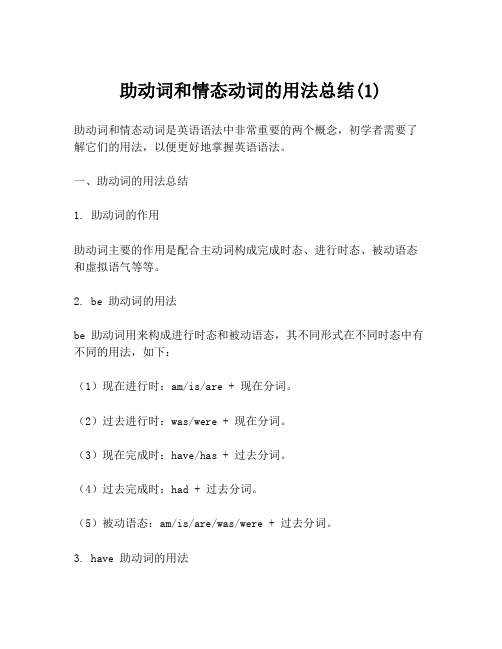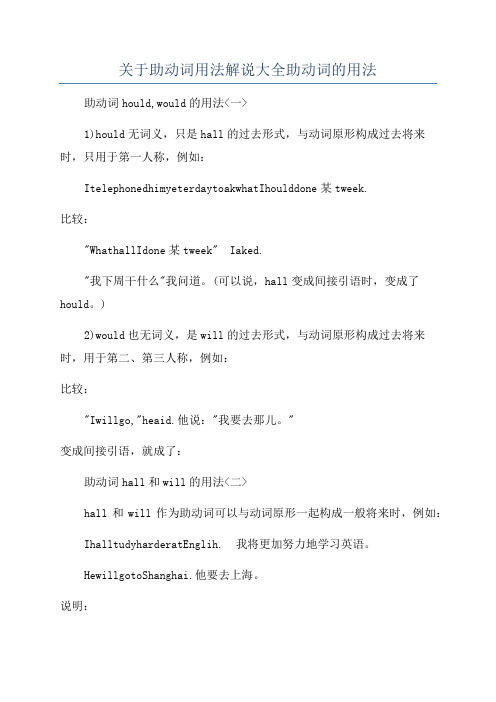英语助动词时态语态用法大全
英语助动词,助你更好的理解语法知识——时态,语态,疑问,否定

英语助动词,助你更好的理解语法知识——时态,语态,疑问,否定英语助动词,你听过,但助动词有哪些?助动词的作用?有仔细研究过?初中英语,助动词有哪些,作用是什么?学好了能更好的理解英语语法;助动词定义:辅助、协助动词一起构成时态,语态,语气,疑问,否定,强调等;其本身无实际意义;常见助动词有:be动词,do,have,will,情态动词我们主要分析前四种助动词,情态动词可作为专门知识点学习,不然容易混淆!根据初中知识点要求,主要分析助动词与动词构成时态,语态,疑问,否定一、助动词第一种作用:辅助动词构成时态现在进行时:be+ Ving (助动词-be动词am,is,are,加上动词ing构成,表示正在)过去进行时:be+ Ving (助动词-be动词 was,were,加上动词ing构成,表示过去正在)一般将来时:will+V原型(助动词will 加上动词原形,表示将要)现在完成时:have/has+done (助动词have/has 加动词过去分词,表示已经)(一般现在时与一般过去时的肯定句直接体现在实义动词上,否定句与疑问句需要助动词协助)I am watching TV. 我正在看电视。
(现在进行时)She was reading books at seven yesterday. 昨天7点她正在读书。
I will go to Chongqing next Friday. 我下周五将要去重庆。
He has worked for 3 hours. 他已经工作了三个小时了。
二、助动词第二种作用:辅助动词构成被动语态被动语态的构成:be+V-ed(助动词-be动词am,is,are,was,were 加上动词的过去分词)The bird was caught by a cat. 那只鸟被一只猫抓住了。
Apples were eaten by him.苹果被他吃完了。
三、助动词第三种作用:构成疑问句,否定句1、一般现在时态疑问句否定句:疑问句:be动词(am,is,are)/do/does提前否定句:be动词/do/does与否定副词 not 连用I like playing football. 变为疑问和否定— Do you like playing football?— I don't like playing football.What do you like to play?(注意:三单形式,谓语动词需要还原为原型)She has a book. - Does she have a book? (has还原为have)What does she have?(has还原为have)She doesn't have a book. (has还原为have)2、一般过去时态疑问句与否定句:疑问句:be动词(was,were)/did提前否定句:be动词/do/does与否定副词 not 连用He studied very hard. 他学习努力。
助动词和情态动词的用法总结(1)

助动词和情态动词的用法总结(1)助动词和情态动词是英语语法中非常重要的两个概念,初学者需要了解它们的用法,以便更好地掌握英语语法。
一、助动词的用法总结1. 助动词的作用助动词主要的作用是配合主动词构成完成时态、进行时态、被动语态和虚拟语气等等。
2. be 助动词的用法be 助动词用来构成进行时态和被动语态,其不同形式在不同时态中有不同的用法,如下:(1)现在进行时:am/is/are + 现在分词。
(2)过去进行时:was/were + 现在分词。
(3)现在完成时:have/has + 过去分词。
(4)过去完成时:had + 过去分词。
(5)被动语态:am/is/are/was/were + 过去分词。
3. have 助动词的用法have 助动词用来构成完成时态,其不同形式在不同时态中有不同的用法,如下:(1)现在完成时:have/has + 过去分词。
(2)过去完成时:had + 过去分词。
二、情态动词的用法总结1. 情态动词的作用情态动词主要用来表达说话人的态度或看法,表示命令、建议、推测、可能性、必要性等含义。
2. 情态动词的种类常见的情态动词有 can、could、may、might、shall、should、will、would、must、ought to 等。
3. 情态动词的用法(1)can/could:表示能力或许可。
(2)may/might:表示可能性或许可。
(3)shall/will:表示意愿或命令。
(4)should/would:表示建议或假设。
(5)must:表示肯定或必要性。
(6)ought to:表示义务或建议。
总之,助动词和情态动词的作用和用法在英语学习中十分重要,初学者应当加强了解和掌握,以便更好地运用于语言学习和交流中。
什么是助动词 有哪些用法

什么是助动词有哪些用法助动词本身没有词义,不可单独作句子谓语。
它仅仅是用来帮助主要动词构成各种时态、语态、语气以及否定和疑问结构。
协助主动词完成其谓语动词“时态”功能的词,也就是说助动词是主动词的帮手。
助动词1)协助主要动词构成谓语动词词组的词叫助动词(Auxiliary Verb)。
被协助的动词称作主要动词(Main Verb)。
助动词自身没有词义,不可单独使用,例如:He doesnt like English.他不喜欢英语。
(doesnt是助动词,无词义;like是主要动词,有词义)2)助动词协助主要动词完成以下功用,可以用来:a.表示时态,例如:He is singing.他在唱歌。
He has got married.他已结婚。
b.表示语态,例如:He was sent to England.他被派往英国。
c.构成疑问句,例如:Do you like college life?你喜欢大学生活吗?Did you study English before you came here?你来这儿之前学过英语吗?d.与否定副词not合用,构成否定句,例如:I dont like him.我不喜欢他。
e.加强语气,例如:Do come to the party tomorrow evening.明天晚上一定来参加晚会。
He did know that.他的确知道那件事。
3)最常用的助动词有:be, have, do, shall, will, should, would 助动词具体用法1)协助主要动词构成谓语动词的词叫助动词。
被协助的动词称作主要动词。
助动词自身没有词义,不可单独使用。
例如:He doesnt like English. 他不喜欢英语。
(doesnt是助动词,无词义;like是主要动词,有词义)2)助动词协助主要动词完成以下功用,可以用来:a. 表示时态。
例如:He is singing. 他在唱歌。
关于助动词用法解说大全助动词的用法

关于助动词用法解说大全助动词的用法助动词hould,would的用法<一>1)hould无词义,只是hall的过去形式,与动词原形构成过去将来时,只用于第一人称,例如:ItelephonedhimyeterdaytoakwhatIhoulddone某tweek.比较:"WhathallIdone某tweek" Iaked."我下周干什么"我问道。
(可以说,hall变成间接引语时,变成了hould。
)2)would也无词义,是will的过去形式,与动词原形构成过去将来时,用于第二、第三人称,例如:比较:"Iwillgo,"heaid.他说:"我要去那儿。
"变成间接引语,就成了:助动词hall和will的用法<二>hall和will作为助动词可以与动词原形一起构成一般将来时,例如:IhalltudyharderatEnglih. 我将更加努力地学习英语。
HewillgotoShanghai.他要去上海。
说明:在过去的语法中,语法学家说hall用于第一人称,will只用于第二、第三人称。
现在,尤其是在口语中,will常用于第一人称,但hall只用于第一人称,如用于第二、第三人称,就失去助动词的意义,已变为情态动词,试比较:助动词do的用法<三>1)构成一般疑问句,例如:DoyouwanttopatheCET 你想通过大学英语测试吗DidyoutudyGerman 你们学过德语吗2)do+not构成否定句,例如:Idonotwanttobecriticized. 我不想挨批评。
Hedoen'tliketotudy. 他不想学习。
Inthepat,manytudentdidnotknowtheimportanceofEnglih. 过去,好多学生不知道英语的重要性。
3) 构成否定祈使句,例如:Don'tgothere. 不要去那里。
英语语法助动词 ppt课件

分类及简介 助动词分为:基本助动词,情态助动 词,半助动词。 基本助动词:be,do,have 情态助动词:shall, will, should, would,could 半助动词:以be为中心成分,以have 为中心成分,以seem为中心成分。
ppt课件 3
一、基本助动词
ppt课件 13
(6)固定词组
May well+do意为“理应有足够的理由” May/might as well+do 用来建议或劝说某人采取是 某种行动。意为“还不如,不妨” He may well be proud of his son. 他大可以以他的儿子为荣。 He might as well throw your money into the sea as lend it to him. 借钱给他还不如把钱扔到海里。 注意:
助动词
ppt课件
1
什么是助动词? 协助主要动词构成谓语动词词组的词叫助 动词(Auxiliary Verb)。被协助的动词称 作主要动词(Main Verb)。 助动词自身没有词义,不可单独使用。如: He doesn't like English.他不喜欢英语。 (doesn't是助动词,无词义;like是主要 动词,有词义)
may较正式,而can口语化。 May (might) I speak to you for a moment, professor? Can(could) I have a cup of tea,mom? d) could 有时也可表示推测,因此三者可以互换。 He may/might/could br at the conference. e) may not 表示不可能时,重音落在may上。 May not表示不许可时,重音落在否定词上。 因此在书面语中,为防止歧义,表示不可能用can’t
助动词知识点

助动词知识点英语中有一些词叫做助动词,也叫做辅助动词。
它们和主动词一起构成各种各样的语态和时态。
学好助动词是理解英语语法和提高口语表达能力的重要手段之一。
下面就来详细介绍助动词的知识点。
一、助动词的定义助动词是用来帮助主动词构成某种时态、语态、否定形式等的一类词。
它们没有词义,主要起到辅助的作用。
二、情态动词情态动词是最常用的助动词,包括 can, could, may, might, shall, should, will, would, must 等。
它们在句中可以表示推测、命令、建议、请求、批准、禁止等意义。
例如:1. You should go to see a doctor if you feel sick.(如果你感觉不舒服,你应该去看医生。
)2. He must be very tired. (他一定很累了。
)3. May I use your phone? (我能用你的手机吗?)4. They might have already left. (他们可能已经离开了。
)三、助动词 do/does/did助动词 do/does/did 用来构成疑问句、否定句和强调句。
在疑问句中,do/does/did 通常要倒装。
在否定句中,do/does/did 和 not 组成 not do/does/did 的形式。
1. Do you like this song? (你喜欢这首歌吗?)2. Does he speak Spanish? (他会说西班牙语吗?)3. Did you see the movie last night? (你昨晚看过那个电影吗?)4. I don't like coffee. (我不喜欢咖啡。
)5. She doesn't live in New York. (她不住在纽约。
)6. They didn't go to the party yesterday. (他们昨天没去参加聚会。
动词详解3
评了。 A bridge should be built here. 这儿应该建座桥。
现在时
过去时
将来时
语态
主动语态
一般时
完成时
进行时
被动语态
以I clean the house为例
I clean the house.
I cleaned the house yesterday.
一般现在时(第三人称单数加 s)
一般过去时(v-ed,见表格)
I will clean the house
将来完成时(will have done)
过去将来时(would do/ was/were going to do)
过去将来完成时(would have done, “本想做但并 未做” )
以I clean the house为例
I have been cleaning the house for 3 hours.
house at this time
tomorrow.
将来进行时(will be doing)
以I clean the house为例
I have cleaned the house for 3 hours.
I had cleaned the house before I cooked.
I will have cleaned the house by 10 tonight.
tomorrow.
一般将来时(will/be going to
I am cleaning the house. do)
I was cleaning the house at this time yesterday. 现在进行时(be doing)
助动词的用法
助动词助动词(Auxiliary Verb):协助主要动词构成谓语动词词组的词。
自身没有词义,不可单独使用。
主要动词(Main Verb):是被协助的动词,构成时态和语态。
He doesn't like English. 他不喜欢英语。
(doesn't是助动词,无词义;like是主要动词,有词义)最常用的助动词有:be, have, do, shall, will, should, would 等。
半助动词:在功能上介于主动词和助动词之间的一类结构。
常见的半助动词:be about to, be due to, be going to, be likely to, be meant to, be obliged to, be supposed to, be willing to, have to, seem to, be unable to, be unwilling to等......情态助动词:1. 情态助动词包括will(would), shall(should), can(could), may(might), must, need, dare, ought to, used to, had better后接动词原形。
2. 情态助动词不受主语的人称和数的限制。
3. 两个情态助动词不能连用。
(误)He will can finish it on time.4.情态助动词:本身有意思,must--必须,can--能够,may--允许、可能,should--应该等。
基本助动词:基本助动词只有三个:be, do, have他们没有词汇意义,只有语法作用,如协助构成进行时,完成时,被动态,否定句,疑问句等。
例如:He is giving a lecture. 他在作报告。
He has made a plan. 已经订了计划。
The small animals are kept in the cages. 小动物都关在笼子里。
英语复习:助动词情态动词归纳
英语复习:助动词情态动词归纳助动词和情态动词本身不能做谓语动词,只能帮动词来构成谓语,起到相关的语法功能助动词:be, do, have一.Be 动词用法1.Be 动词后接现在分词,构成进行时态He is cleaning the classroom2.Be 动词后接过去分词,构成被动语态These iphones are made in China3.Be 动词后接不定式,分下列几种情况情况一:表示未来的计划或安排The Girl's Generation is to leave for Shanghai tomorrow.情况二:表目的The dinner is to honour the guestsYour job is to take care of the baby情况三:表可能(近似于can, may)Such books are to be found in any library情况四:表示命令,应该....(近似should/ought to)You're to hand in your exercise this afternoon.二.Do 的用法1.构成疑问,否定,祈使句Do you always play table tennis?I don't think he will comeDo remember to your family2.表示强调The letter we were expecting never did arrive.三.Have 的用法构成完成时态或虚拟语气I have seen the film.If you had listened to the doctor, you would be much better now.情态动词情态动词用法1.can/could 表示能力I could swim across the river when I was young表示客观可能性(理论上的),用于肯定句Anybody can make mistakesAccidents can happen on such rainy days.表示请求,允许Can I go now? Could you lend me some money?表示惊讶,怀疑How can Bigbang come to Chongqing?2.shall 用于第一,三人称疑问句中,表征求对方意见Shall I write it down?Shall he come in?用于第二,三人称陈述句,表示命令,警告You shall never see Allen Su's concert unless you can sing his song. should表示建议,劝告或推测,当“应该”讲Lie to ME should be a good serial We should strict with ourselves.ought to 和should 一样表示应该,可能性还要更大Human ought to stop polluting nature Studying oughtn't to occupy all of your spare time3. will/would 表示意志或愿望I will never do that again表示请示,建议Would/will you please tell me the way to the CSC?表示经常,习惯性动作Fish will die without water表示预料或猜想It will be about ten minutes' way to get CSC4.may/might 表示允许许可,否定回答时,用mustn'tMay I watch TV after supper?Yes, you may. / No, you mustn't表示推测,否定时没有mightn't 说法,5. 区分may not/ can not 用法It may be a trick.He may not come todayIt can't be our headteacherMay 在祈使句表祝愿May you success.May you have a happy life6.must 必须,强调主观,用于非常肯定的推测You must come to school on timeJustin Biber must be famous in European contrieshave to 必须,不得不,客观I have to go now, and it's already 12:00ed to 过去常常... 现在没有I used to be the fan of HejieHe didn't use to go to work by bike8.had better 最好,接动词原形,否定为had better notYou'd better talk so loudly.What had we better do next?9.would rather 宁愿,接动词原形I would rather dance with Micheal10.need 情态动词,用于否定,疑问句中,需要,必要You needn't ask me the questionNeed I finish the work before ten? Yes, you must.实意动词,need to doneed to be done=need doingI need to go to Beijing to attend an important meeting.The windows need to be cleaned/ cleaningWe don't need to watch this film11.dare 情态动词,敢,用于否定,有过去式dared,I dare say, 固定短语。
助动词的运用
助动词的运用最常用的助动词有:be, have, do, shall, will, should, would1)协助主要动词构成谓语动词词组的词叫助动词。
2)被协助的动词称作主要动词。
3)助动词自身没有词义,不可单独使用。
例如:He doesn't like English. 他不喜欢英语。
(doesn't是助动词,无词义;like是主要动词,有词义)4)助动词协助主要动词完成以下功用,可以用来:a. 表示时态,例如:He is singing. 他在唱歌。
He has got married. 他已结婚。
b. 表示语态,例如:He was sent to England. 他被派往英国。
c. 构成疑问句,例如:Do you like college life? 你喜欢大学生活吗?Did you study English before you came here? 你来这儿之前学过英语吗?d. 与否定副词not合用,构成否定句,例如:I don't like him. 我不喜欢他。
e. 加强语气,例如:Do come to the party tomorrow evening. 明天晚上一定来参加晚会。
He did know that. 他的确知道那件事。
于第三人称单数(he/she/it) does 用于第三人称单数。
did则是do,does的过去式,表示发生在过去的行为或动作, did没有单数,也就是可以用在主语为第三人称的句子中,不受人称的限制.do ,done, does, did (帮助句子变疑问句,否定句,强调谓语动词作用)谓语: 是在主语的后面,准确得来说,谓语是动词,在英语里,动词也就是主语所执行的动作。
基本助动词基本助动词基本助动词只有三个:be, do, have, 他们没有词汇意义,只有语法作用,如协助构成进行体,完成体,被动态,否定句,疑问句等。
- 1、下载文档前请自行甄别文档内容的完整性,平台不提供额外的编辑、内容补充、找答案等附加服务。
- 2、"仅部分预览"的文档,不可在线预览部分如存在完整性等问题,可反馈申请退款(可完整预览的文档不适用该条件!)。
- 3、如文档侵犯您的权益,请联系客服反馈,我们会尽快为您处理(人工客服工作时间:9:00-18:30)。
本文档为精品文档,如对你有帮助请下载支持,如有问题请及时沟通,谢谢支持! 1 英语助动词时态语态用法大全 动词时态和语态(1) 一、动词的分类和形式: 动词是表示动作和状态的词。动词有时态、语态和语气3种形式的变化。 1、动词按其能否独立作谓语而分为:“谓语动词”和“非谓语动词”两种 2、动词的4种基本形式:动词原形、过去式、过去分词和现在分词。 3、动词按其构成动词词组作用分为:实义动词、连系动词、情态动词和助动词。1)实义动词分为及物动词和不及物动词。还可分为持续性动词和瞬间动词;2)连系动词有两种:一种表特征或状态,另一种表状态变化过程。
4、五种不同的短语动词:1)“动词+介词”;2)“动词+副词”;3)“动词+副词+介词”;4)“动词+名词(或代词)+介词”;5)“be+形容词(包括相当于形容词的过去分词+介词”。
二、动词的时态:
1、一般现在时的用法:1)表示现在的习惯,经常发生的动作或存在的状态。2)表示主语的特征、性格和能力。3)表示客观事实或真理。4)表示按照计划安排好的将来行为。(只限于是go,come, leave, start, stop, be等开始或移动意义的词。)
2、一般过去时的用法:1)表示过去的动作或状态。2)叙述过去连续发生的事情。3)表示过去一段时间内经常发生的动作。
3、一般将来时的用法:1)表示将来的动作或状态。2)表示将来的经常动作。 4、现在进行时的用法:1)表示说话时正在进行的动作。2)表示现阶段正在进行的动作。(说话时动作不一定进行。)
5、过去进行进的用法:1)过去某一时刻或某一段时间内正在进行的动作。2)表示移动的动词:come, start, stay, leave, go等词的过去进行时可以表示过去的将来要发生的动作。3)was going to do可以表示在过去某一时间之后发生的动作。 本文档为精品文档,如对你有帮助请下载支持,如有问题请及时沟通,谢谢支持! 2 6、现在完成时的用法:1)表示刚刚完成的动作,常与just连用。2)表示过去发生而持续到现在的动作或状态,甚至延续到将来。常与since, for连用,但for, since不能与终止性的动词连用。3)表示过去的动作对现在造成的影响或结果。
7、现在完成时与一般过去时的区别:1)现在完成时与现在有联系,它表示过去的动作对现在所产生的结果、影响。一般过去时通常表示在过去某一具体时间发生的动作,与现在没什么联系。2)现在完成时表示过去延续到现在的行为;一般过去时着重过去某一时刻的某一具体动作。
8、过去完成的用法:1)表示在过去某一或动作之前已经完成的动作。常与by, before等介词短语或一个状语从句或上下文暗示。2)表示由过去某一时间开始,一直延续到过去另一时间的动作,常和for(有时可省去)或since 构成的短语或since引导的从句连用。
9、过去将来时的用法:表示对于过去某一时刻而言将要发生的动作或存在的状态。 练习一:动词时态与语态(1) 1. When I saw Mary, she ______ on the piano. A. is playing B. plays C. was playing D. played 2. She ______ the door before she goes away. A. had locked B. is locking C. has locked. D. was locking. 3. A hunter is a man who ______ animals. A. catch B. catches C. will catch D. was catching 4. What _____ if I drink this? A. happens B. is happening C. will happen D. is happened 5. I will visit you if Father ______ me. A. let B. lets C. is letting D. will let 6. Look out! That tree _____ fall down. A. is going to B. will be C. shall D. would 7. My uncle _____ to see me. He'll be here soon. A. comes B. is coming C. had come D. came 8. They can't leave until they _____ their work. A. did B. are doing C. have done D. has done 本文档为精品文档,如对你有帮助请下载支持,如有问题请及时沟通,谢谢支持! 3 9. "Has he seen this film?" " Yes. He ______ it several days ago. " A. saw B. has seen C. had seen D. was seeing 10. Now Mike isn't here. He ______ Mr Green's. Perhaps he ______ back in a few minutes. A. went to; is coming B. has gone to; will come C. has been to; will be D. is going to; has come 11. That day he ._______ his clothes before he came to see me. A. has washed B. washed C. had been washing D. was washed 12. I haven't finished my composition. I ______ for two hours and a half. A. have written it B. have been writing it C. wrote it D. am writting it 13. I will take my daughter with me when I _____ ShangHai, A. go to B. will go to C. have been to D. have gone to 14. This bright girl ______ the truth in front of the enemy. A. didn't say B. couldn't speak to C. said D. didn't tell 15. The bridge which ______ last year looks really beautiful. A. was built B. built C. was set up D. had been built 16. " When ______ school begin?" " Next Monday. " A. has B. does C. did D. is going to 17. I will ______ here till you give me some money. A. leave B. not leave C. come D. return 18. I _____ here since I moved here. A. will work B. worked C. work D. have been working 19. Every time I _____ there, I will buy him something nice. A. went B. will go C. go D. have gone 20. It was said that his father ______. A. has died B. died. C. has been dead D. had died 21. We won't go unless you ______ soon. A. had come B. came C. will come D. come 22._____six years since I began studying English. 本文档为精品文档,如对你有帮助请下载支持,如有问题请及时沟通,谢谢支持! 4 A. They have been B. it is C. It was D. There are 23. They ______ the Summer Palace three times. A. have gone to B. have been to C. have been in D. have gone into 24. "How long haven't we seen each other? ""Well, it _____ nearly two years since we ______ last. " A. is/have met B. was/had met C. is/met D. has been/had met 25. "Have you seen the art exhibition?" "No, _____ there. " A. it was not being held B. they didn't hold C. it had not held D. they were holding it 26. Don't get off the bus until it ______. A. stop B. will stop C. stopped D. has stopped 27. "Where ______ the recorder? I can't see it anywhere." "I _____ it right here. But now it's gone. " A. did you put/have put B. have you put/put C. had you put/was putting D. were you putting/have put 28. They asked me to have a drink with them. I said that it was 10 years since I ______ a good drink. A. had enjoyed B. was enjoying C. enjoyed D. had been enjoying 29. Don't come tonight. I would rather you _____ tomorrow. A. come B. came C. will come D. coming 30. ______ you ______? A. Do/marry B. Have/married C. Have/been married D. Are/married 31. When he ______ all the newspapers, he'll go home. A. sells B. has sold C. will have sold D. will be sold 32. "This cloth _____well and _____ long. ""Ok. I'll take it. " A. washes/lasts B. is washed/lasted C. washes/is lasted D. is washing/lasting 33. "Hurry up, you ______ on the phone. " "Oh, I'm coming. Thank you. " A. are wanted B. are being wanted C. want D. are wanting 34. I ______ see you, but I didn't, for I had no time. A. had wanted to B. has wanted to C. wanted D. was wanted
